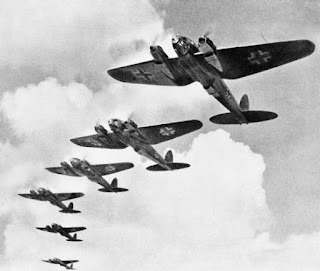- The Battle of Britain got its name before it even started. It got its name from something Winston Churchill said in his famous “This was their finest hour” speech on 18th June 1940. He said, “the Battle of France is over … the Battle of Britain is about to begin”.
- The battle took place over several months with no real consensus as to exactly when it started. Small scale night raids began in late June 1940. The first raid by day was on July 1. The main assault began in mid August. In the UK, the officially recognised dates are July 10 to October 31, 1940, while in Germany it is said to have lasted until June 1941.
- It was the first ever battle which was almost exclusively fought by air forces.
- Why did it happen? Hitler recognised that Britain was a major obstacle in the way of his conquering Europe and wanted them out of the war. Surprisingly, his first plan was to negotiate a peace treaty so Britain would be on his side. Winston Churchill told him where he could stick his peace treaty and so Hitler had to move on to plan B – the invasion of Britain, code named Operation Sealion. The main obstacle standing in the way of this was Britain's Air Force, the RAF. The Battle of Britain was essentially Hitler's attempt to establish air superiority over the RAF so he could invade. It failed, and Operation Sealion was permanently shelved. Hence the Battle of Britain is considered the first major defeat of Germany in the war.
- 15th September 1940 was a day of heavy and sustained fighting as the Luftwaffe launched its largest and most concentrated attack. Around 60 German aircraft were downed by the RAF on that day. The Luftwaffe was defeated so decisively that day that it was the date chosen as Battle of Britain Day in the UK.
- We don't know for sure how many planes were lost during the Battle of Britain but the official figures say that the RAF lost 1,023 and the Luftwaffe 1,887. 1,542 of the RAF aircrew and 2,585 of the Luftwaffe aircrew were killed. There were around 90,000 civilian casualties.
- Not all the people fighting on the British side were actually British. There were 2,334 British aircrew, and also 145 Poles, 126 New Zealanders, 98 Canadians, 88 Czechs, 33 Australians, 29 Belgians, 25 South Africans, 13 Frenchmen, 11 Americans, 10 Irishmen and small numbers from other countries, too. The fighter squadron which destroyed the most German aircraft was the Polish No. 303 fighter squadron, which destroyed 126 of them.
- The most successful British pilot was Eric Stanley Lock, who destroyed at least 20 German aircraft and probably 7 more. Another airman worthy of a mention is RAF Sergeant Ray Holmes. He was flying a Hawker Hurricane fighter over London on 15 September and had run out of ammunition so was about to retreat when he spotted a German plane heading for Buckingham Palace. He steered his plane at the German and cut the tail of his plane off with his wing. The German bomber crashed near Victoria Station and the palace was saved. Holmes's plane was written off, too, but he survived.
- The head of the RAF at the time was Sir Hugh Dowding. The air defence system in place at the time was called The Dowding System, and there was more to it than pilots and planes. They not only had radar to tell them when an attack was coming but also the Observer Corps, the volunteers who manned observation points 24 hours a day to track incoming aircraft. Once it was known which direction the German aircraft were heading in the information was passed on to the relevant sector which would ‘scramble’ its fighters into action. The Dowding System could process large amounts of information quickly and ensure the defences were only scrambled exactly where they were needed. Then there were mechanics, maintenance staff, and the factory workers producing the aircraft and parts for them.
- Winston Churchill summed up the effect of the battle and the contribution of RAF with the famous quote, “Never in the field of human conflict was so much owed by so many to so few”. Pilots who fought in the battle are known as “The Few”.
More details about my books. Follow this link if you like Superheroes, Psychics and/or quirky short stories.
I've listed the themes each novel touches on here for easy reference.
Like my author page on Facebook for news on new books and blog posts.
Check out my Writing blog


No comments:
Post a Comment